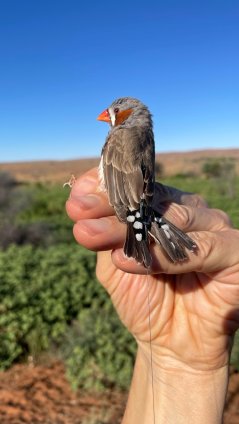Project
Communication and resilience in an unpredictable world
In this ecological field research, we study the communication underlying breeding decisions in wild zebra finches (Taeniopygia castanosis) who breed under varying and unpredictable conditions. Zebra finches are the best-studied avian model organism in the lab for behaviour, mate choice, life history decisions, and the function of male song. Yet, there is very little information about the communication process when making breeding decisions. We conduct our field research in cooperation with Simon Griffith at Macquarie University in Sydney at the Fowlers Gap Research Station in the Australian Outbacks.
Our main current focus is on determining the social organization of zebra finches using a high tech automatized radio tracking system, supported by the Next Level Animal Science Initiative of our Department and by the Sectorplan Biology. We use lightweight solar-powered radio tags along with a grid of local receivers which collect tag data and stream these to a central station from which data can be accessed for further analyses. Manuscripts on this project are on the way, so stay tuned.
Previous research on zebra finches
Within the framework of an NWO ALW open competition grant we determined the nature if the song communication system, its spatial and social behaviour as well as its breeding ecology under the extreme and variable ecological conditions of the Australian Outbacks (Adrian et al 2022, Loning et al 2022, Loning et al 2023a,b).
One specific question, which we addressed is the function of male song. Birdsong is the best studied animal communication system, yet the singing behaviour is puzzling in this prime avian model organism. Unlike most temperate zone songbirds, zebra finches are not territorial and males, being 'faithfully' paired with a female and with very low occurrence of extra-pair matings, sing mostly after pair formation. Thus the common interpretation that birdsong functions in territorial defence and mate attraction does not explain singing raising broader question on the functions and evolution of birdsong. We show that zebra finch song is audible for only ca 9 meters (Loning et al 2022) and that males sing I various social and environmental conetxts throughout the year, showing that male song here primarily does not function in neither mate attraction nor territory defence, but serves more wider social function in within pair and colony communication (Loning et al 2023).

In earlier lab based work we used zebra finches, funded by ASAB and the German Research Council, as model organism. Here, we used zebra finches (e.g. Naguib et al 2004; Krause and Naguib 2014, Honarmand et al 2015, 2017), to determine the effects of developmental stress during different discrete stages in development on a range of behavioural traits, life history and reproductive success, also across several generations. This project has important implications in both animal welfare and evolutionary ecology in more general terms, since it allows to trace adult behavioural and life history traits to the conditions experienced during early development. The results thus contribute to our general understanding of non-genetic (epigenetic) effects on phenotypic variation within and across generations. The topics of these earlier lab studies also contribute to the current field project in the Australian Outbacks (see above), where zebra finches have to cope with variable and challenging environmental conditions.
MSc thesis options available
Interested in joining the field work (or data analyses)? Please contact:
Cooperating partner: Simon Griffith (Macquarie University, Sydney, Australia)
Field work at: Fowlers Gap Research Station in NSW, Australia
Selected studies from our previous lab-based research on zebra finches:
Honarmand, M. Krause, E.T., Naguib, M. 2017. Implications of nutritional stress as nestling or fledgling on subsequent attractiveness and fecundity in zebra finches (Taeniopygia guttata). PeerJ 5: 33628.
Honarmand, M., Riebel, K., Naguib, M. 2015 Nutrition and peer group composition in early adolescence: impacts on male song and female preference in zebra finches. Animal Behaviour 107, 147-158.
Krause, E.T., Honarmand, M., Naguib, M. 2011. Zebra finch nestlings beg more under better nutritional conditions. Behaviour 148, 1239-1255.
Krause, E.T., Naguib, M. 2011. Compensatory growth affects exploratory behaviour in zebra finches (Taeniopygia guttata). Animal Behaviour 81, 1295-1300.
Krause, E.T., Honarmand, M., Wetzel, J., Naguib, M. 2009. Early fasting is long lasting: Differences in early nutritional conditions reappear under stressful conditions in adult female zebra finches. PLoS one 4(3): e5015.
Naguib, M., Nemitz, A., Gil, D. 2006. Maternal developmental stress reduces reproductive success of female offspring in zebra finches. Proceedings of the Royal Society B 273: 1901-1905; highlighted in Current Biology 2006: 16(9)R309.
Naguib, M., Gil, D. 2005. Transgenerational effects on body size caused by early developmental stress in zebra finches. Biology Letters 1, 95-97.



